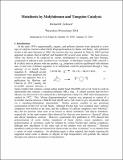Metathesis by Molybdenum and Tungsten Catalysts
Author(s)
Schrock, Richard Royce
DownloadMain article (491.6Kb)
OPEN_ACCESS_POLICY
Open Access Policy
Creative Commons Attribution-Noncommercial-Share Alike
Terms of use
Metadata
Show full item recordAbstract
Carbon–carbon double bonds are an integral part of the chemical industry and are widely found in natural products, from the small and simple (ethylene) to the large and complex. The ability to manipulate carbon–carbon double bonds to make other carbon–carbon double bonds in a catalytic and stereospecific fashion has revolutionized the way organic molecules and polymers are made today. This article outlines the development of modern molybdenum and tungsten alkylidene catalysts that can be designed at a molecular level to achieve a given result. Carbon–carbon triple bonds also can be manipulated in a similar manner with the appropriate alkylidyne catalyst. Although the 'alkene metathesis' and 'alkyne metathesis' reactions are now fifty to sixty years old, many problems remain that will require an even more detailed understanding of these most intricate, superficially simple reactions.
Date issued
2015-08Department
Massachusetts Institute of Technology. Department of ChemistryJournal
CHIMIA International Journal for Chemistry
Publisher
Swiss Chemical Society
Citation
Schrock, Richard R. “Metathesis by Molybdenum and Tungsten Catalysts.” CHIMIA International Journal for Chemistry 69.7 (2015): 388–392.
Version: Author's final manuscript
ISSN
00094293